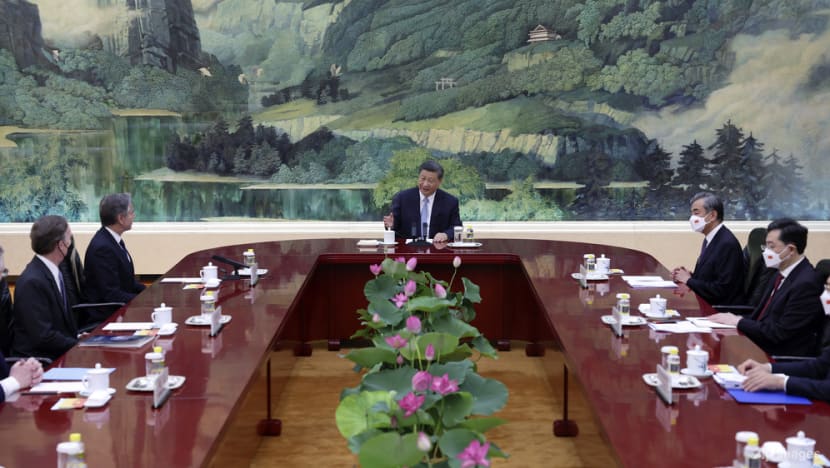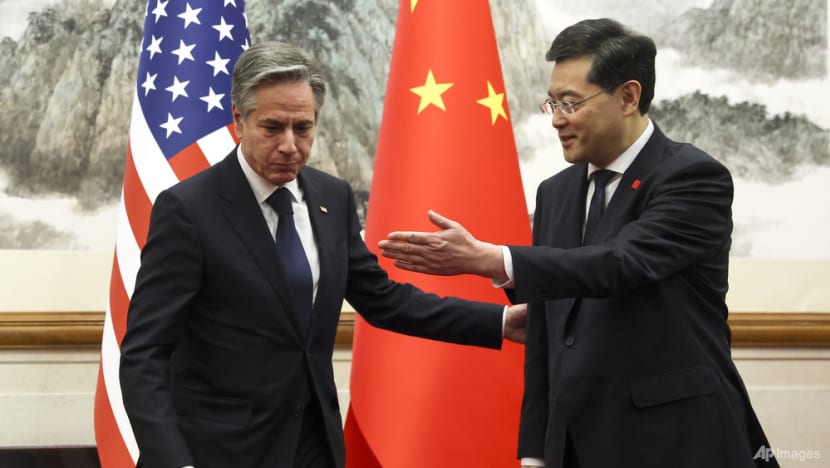‘Dialogue is only dialogue’: Blinken’s visit keeps US-China conversation going, but deep divide remains
Mr Blinken, who postponed a February China trip after a suspected Chinese spy balloon flew over US airspace, is the highest-ranking US government official to visit the country since President Joe Biden took office in January 2021.

In this photo released by Xinhua News Agency, Chinese President Xi Jinping, centre, talks to US Secretary of State Antony Blinken, second left, as Wang Yi, third right, Chinese Communist Party's foreign policy chief, listens during a meeting at the Great Hall of the People in Beijing, China, Monday, Jun 19, 2023. (Wang Ye/Xinhua via AP)
United States Secretary of State Antony Blinken’s much-awaited trip to China will unlikely result in major breakthroughs beyond boosting efforts to maintain open lines of communication, said observers on Monday (Jun 19).
“We have really lost a diminished sort of communication network with China, as one crisis after another has led to increasingly confrontational relations,” China observer Orville Schell told CNA938.
“It's good (that Mr Blinken is) there, but dialogue is only dialogue unless it actually leads to something. In this case, I think the expectations are very low, but just to keep the channel open is something.”
The two-day visit, which will end on Monday, is the first by a US Secretary of State to China in five years.
Mr Blinken postponed a February China trip after a suspected Chinese spy balloon flew over US airspace. He is the highest-ranking US government official to visit the country since President Joe Biden took office in January 2021.
POSSIBILITY OF MORE TALKS
Analysts expect it to pave the way for more bilateral meetings between Washington and Beijing.
It could also set the stage for meetings between Chinese President Xi Jinping and Mr Biden at multilateral summits later this year.
The world’s two largest economies have a long list of issues to iron out, ranging from US efforts to hold back China's semiconductor industry to the status of self-governed Taiwan, which China claims as its own.
“There are hopeful signs, in the sense that it's absolutely critical that great powers talk to each other, particularly when they're involved in very dodgy, potential military accidents and altercations, as we see repeatedly in the South China Sea, East China Sea and Taiwan Straits,” said Dr Schell, the Arthur Ross director of Asia Society's Center on US-China Relations.
“But China does have a very lamentable habit of dialoguing people to death with nothing happening.”

On Sunday, Mr Blinken and Chinese Foreign Minister Qin Gang held talks on a range of topics, from Taiwan to trade.
Both sides also agreed that Mr Qin should visit Washington to continue the conversation at a convenient time, “which could mean anywhere from tomorrow to never”, said Dr Schell.
“You have to take all this with a grain of salt.”
CHINA’S VAST STRATEGIC AMBITIONS
Australian Strategic Policy Institute senior analyst Malcolm Davis noted that China has vast strategic ambitions, many of which conflict with the strategic interests of the US and its allies.
“I don't think we should get our hopes up that some sort of major breakthrough is going to happen in this relationship over a series of meetings,” Dr Davis told CNA’s Asia First.
“We can establish dialogues, we can put down what the Biden administration talks of guardrails. But ultimately, it's China's ambitions in the Indo-Pacific, particularly in relation to Taiwan and also in the South China Sea - that is really the cause of the tensions at the moment.”
China's goal, in the long term, is to emerge as the dominant actor in the Indo-Pacific region and ultimately see the retrenchment of US strategic primacy, he added.
“Clearly, the US is not about to accept that sort of big change in its strategic circumstances that would be hugely disadvantageous to the US interests.”
The Asian giant regards the US as a declining power and is “making a systemic challenge to the United States in every respect”, said Dr Davis.
“So this is the strategic competition that we're now in. It's going to last decades. It's not gonna be resolved over breakfast, let alone anything else.”
On Monday, Mr Blinken met with China's top diplomat Wang Yi, where they touched on the challenges in overcoming the friction between the two countries.
WILL MR BLINKEN’S TRIP HELP RELATIONS?
Mr Blinken's visit to China has been closely followed by the rest of the world, as any escalation between superpowers could have worldwide repercussions.
“I think (President Xi) has dedicated himself to a rejuvenation of China's greatness, and that means it wants to have equal status,” said Dr Schell. “It also wants respect from the Western world and the United States.
“The problem is, and this is where political systems come crashing into the room and wreck everything, they have an autocratic political system, and it's very hard for the liberal democratic West to respect that and confer a sense of equality and congeniality.”
Experts noted that only time will tell if Mr Blinken’s visit would help tone down the temperature on sensitive issues, adding that previous discussions between both countries have not made much progress.
China has “a tendency to hold one issue hostage to another,” said Dr Schell.
“Namely, if you don't yield to us in Taiwan, we're not gonna set up military-to-military relations or hotlines. So it's a very complex tableau, where everything gets connected up to everything else.”
He added that China is “very loath to bring even issues of common interest to the table in a meaningful way”.
Dr Davis believes incidents in the South China Sea, for instance, are unlikely to stop.
“The Chinese are determined to control the South China Sea,” he added.
“The US and its allies are determined to challenge that control, because it is after all international waters and international airspace. It's not Chinese territorial waters, irrespective of what the Chinese claim.”
On the issue of Taiwan, Dr Davis said the US has a fundamental choice to make, because “if it does nothing, its strategic credibility in the Indo-Pacific region is completely gone”.
“But if it does respond, if it does intervene to support Taiwan, then we're looking at a major war between China and the United States,” he noted.
“And I don't think any diplomatic discussions are going to alleviate that, because the interests and the stakes involved around Taiwan are so great for both sides that it's very difficult to see a way back from that.”
EXPECTATIONS OF QUID PRO QUO
Moving forward, Beijing, in return for the US easing sanctions, could make constructive contributions to ensure stability, analysts suggested.
“So far, there's no sign of that. If all it is the case of America providing concession after concession in the hope that Beijing will moderate its stance, they're gonna be sorely disappointed because China is not going to do that,” said Dr Davis.
“So it has to be a quid pro quo. It can't be America providing the concessions and China pocketing those and then continuing to further its objectives at the expense of American interests.”
Washington runs the risk of simply emboldening China’s ambitions if it, in a desire to provide guardrails and provide some sort of stable relationship with Beijing, falls back on that approach of offering more concessions, he added.
“That's the worst possible scenario and the worst possible policy that the Biden administration could pursue. So I do think it has to be a balanced one,” said Dr Davis.
“We have to go into this relationship with a willingness to engage and a willingness to talk to the Chinese, but do so from a position whereby the US and its allies are going to defend their key interests.”
Related:
Observers stressed that regular talks between the global powers are necessary to manage their relationship.
“If we can have those discussions, that does help. But we shouldn't kid ourselves that somehow the Chinese are gonna moderate their behaviour or give up on their ambitions regarding the South China Sea or Taiwan,” Dr Davis said.
“That's where the concept of integrated deterrence comes to the fore. We have to stand firm, and the US and its allies have to work together to deter China, so that President Xi does not decide to use force either against Taiwan or in the South China Sea or elsewhere.”















